Wix vs WordPress: Final Verdict
Wix and WordPress both offer powerful website-building solutions, but they serve different types of users.
Wix (Overall Grade: 8.5/10)
Wix is perfect for beginners, offering easy-to-use marketing tools, customizable templates, and excellent customer support. Its AI features and fast website optimization make it even more appealing. If you want a simple, all-in-one platform without technical hassles, Wix is the way to go.
WordPress (Overall Grade: 7.1/10)
WordPress is ideal for those seeking advanced design control and extensive customization options. With its vast plugin library and open-source nature, it offers unmatched flexibility, making it perfect for developers and businesses with specific needs. While it comes with a steeper learning curve, the ability to create exactly what you want makes it worth the effort. If you need a platform that can adapt and grow with your requirements, WordPress is the best choice.

|

|
|
|---|---|---|
Design functionalities & templates |
8.6 |
9.0 |
Ease of use |
9.0 |
7.2 |
Ecommerce |
8.0 |
8.4 |
Website Editors |
8.5 |
8.5 |
Product testing options |
8.1 |
8.1 |
Price |
8.7 |
5.9 |
Hosting quality |
8.5 |
0 |
Website speed optimization |
8.3 |
6.5 |
Plugins and integrations |
8.2 |
8.8 |
Marketing features |
8.4 |
8.0 |
Customer support |
8.2 |
5.0 |
Security |
8.5 |
6.7 |
AI capabilities |
8.7 |
6.1 |
User Management |
8.2 |
8.8 |
| Overall | 8.5 |
7.1 |
Which one is the best for ecommerce: Wix or WordPress?
 8.0
8.0
 8.4
8.4
Verdict
: Wix is excellent for beginners and small businesses, while WordPress, with WooCommerce, offers extensive customization and scalability for more complex ecommerce needs.
Wix
: Wix is ideal for those new to ecommerce. It offers a range of customizable templates and basic inventory tools, making it a great choice for small-scale online stores. However, when comparing Wix vs WordPress, Wix may lack the advanced customization options that more experienced users might require.
WordPress
: With the help of WooCommerce, WordPress provides a highly customizable ecommerce solution. It supports multiple payment gateways, a wide range of plugin options, and advanced SEO tools, making it a perfect choice for larger and more complex online stores. However, it may require more technical knowledge to set up and manage effectively.
Which one is the best for informational and business websites?
 8.3
8.3
 9.2
9.2
Verdict
: When it comes to creating informational business websites, WordPress takes the lead with its broad customization options and powerful features, while Wix offers a more user-friendly experience.
Wix
: Scoring 8.3, Wix is all about simplicity and speed. Its drag-and-drop builder is incredibly user-friendly, letting even those with no technical experience create a professional-looking website in no time. Wix offers a variety of attractive templates and essential tools that cover most needs for small businesses and personal projects. While it doesn’t offer the deep customization of WordPress, Wix’s straightforward, all-in-one platform is ideal for those who want to get online quickly without dealing with the complexities of a more advanced system.
WordPress
: With a higher score of 9.2, WordPress stands out for its comprehensive customization options, thanks to a wide range of themes and plugins. As an open-source CMS, it offers greater creative control and flexibility, making it perfect for more complex informational websites. WordPress is ideal for users who are comfortable with a steeper learning curve and want to take advantage of advanced features and functionalities for their business sites
Wix vs WordPress: Detailed comparison
Design functionalities & templates
Design FunctionalitiesRepresents how well each platform allows for creative design and customization of websites.Score Components:
- Template Variety (30%): Range and quality of design templates.
- Customization (30%): Flexibility and options for design alterations.
- User Interface (20%): Ease and intuitiveness of the design process.
- Responsiveness (10%): Adaptability to different devices and screen sizes.
- Innovation (10%): Unique design features and tools.
 8.6
8.6
 9.0
9.0
🏆
Winner: WordPress.
If you’re looking for a platform that offers more creative control, a wide supply of design features, and extensive customization options, WordPress is the preferred choice.
Wix offers creative freedom in design, attracting a diverse user base. While Wix doesn’t have a premium template marketplace, it has 3-rd party theme shops that allow you to get more sophisticated design choices.
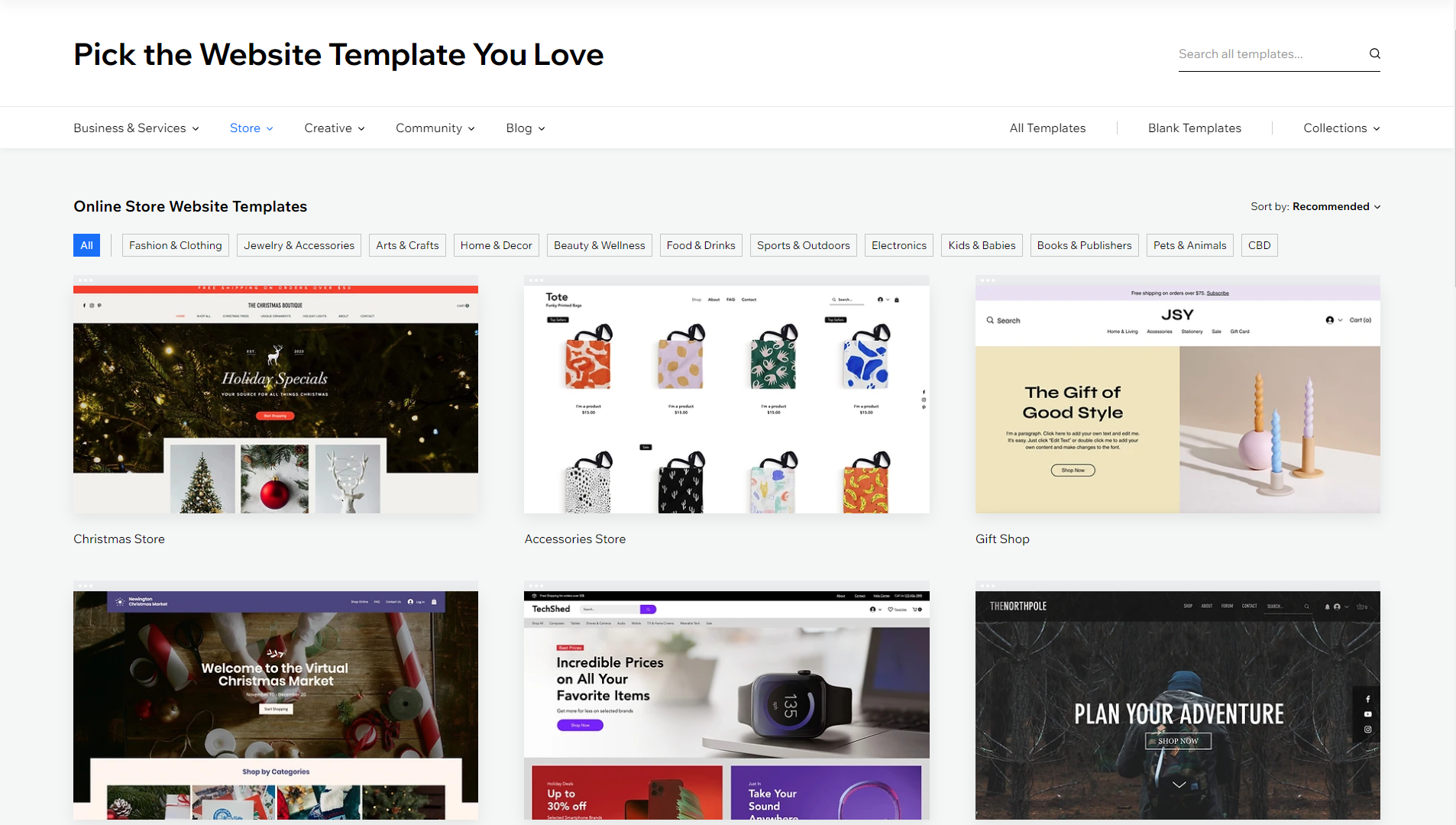

Compared to Wix, WordPress offers a large variety of templates and designs, catering to a wide range of website types beyond just blogs or ecommerce. Its open-source nature allows for high customization and creative freedom, appealing to diverse user needs. While WordPress itself doesn’t sell premium templates, numerous third-party theme shops offer sophisticated and specialized design choices, expanding the possibilities for users.
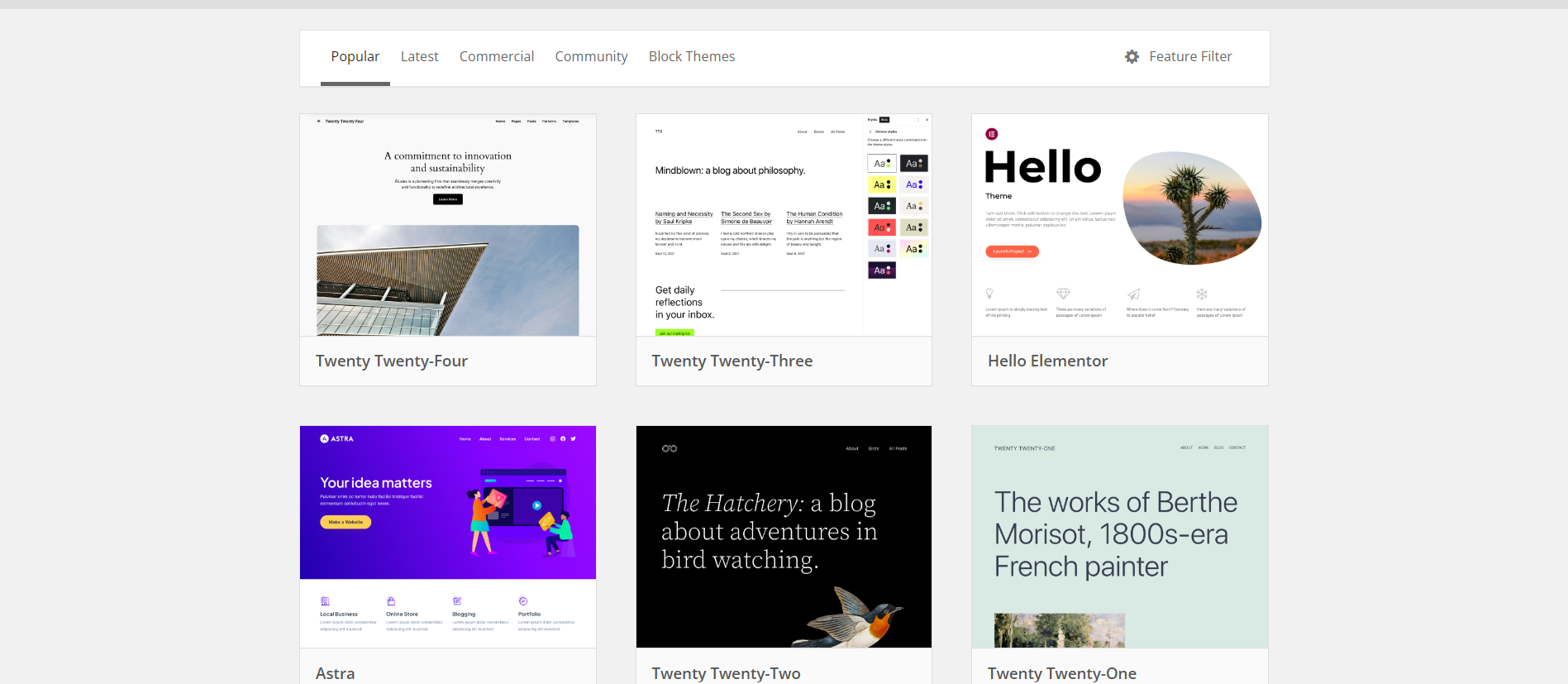

Get a head start on website creation with AI
Create a custom website tailored to your business needs 10X faster with 10Web AI Website Builder!
Ease of use
Ease of useReflects the platform’s overall user-friendliness.Score
Components:
- Learning curve (40%): Quickness and ease of getting started.
- Interface design (30%): Simplicity and intuitiveness of layout.
- User guidance (20%): Quality of tutorials and support.
- Flexibility (10%): Adaptability to various user skills.
 9.0
9.0
 7.2
7.2
🏆 Winner: Wix
. Scoring a solid 9.0, Wix stands out for its exceptional user-friendliness, making it exceptionally easy for beginners to create and manage their websites. WordPress, with a score of 7.2, offers great flexibility and power but can be less intuitive for beginners. If ease of use is a priority, Wix is the clear winner in this category.
Learning Resources
🏆 Winner: WordPress
. While both platforms offer solid learning resources, WordPress goes a step further with its detailed documentation, community forums, online tutorials, and courses, making it easier for users to learn and adapt.
For ecommerce
EcommerceMeasures the platform’s effectiveness in supporting online business activities.Score Components:
- Ecommerce themes and templates (20%): Variety and design of templates.
- Product management (25%): Ease of managing and organizing products.
- Payment options (25%): Variety and convenience of payment methods.
- Ecommerce features (20%): Features for managing an ecommerce store.
- Integration (10%): Compatibility with external e-commerce tools and services.
 8.0
8.0
 8.4
8.4
When it comes to ecommerce, both Wix and WordPress offer robust features. Wix provides an intuitive store builder, various payment gateways, basic inventory tools, multi-channel sales options, abandoned cart recovery, and basic analytics and SEO tools. On the other hand, WordPress, with the help of plugins like WooCommerce, offers multiple payment gateway support, abandoned cart recovery, ecommerce analytics, SEO optimization tools, and a large plugin ecosystem.
 |
 |
|
|---|---|---|
Ecommerce themes and templates |
7.5 |
9.2 |
Product page customization |
7.3 |
9.0 |
Payment processing and commissions |
8.7 |
7.5 |
POS capabilities |
6.0 |
6.5 |
Payment gateways |
8.2 |
8.5 |
Product numbers |
8.0 |
7.0 |
Additional ecommerce features |
7.8 |
8.0 |
Wix ecommerce features:
- Intuitive store builder
- Wix Payments and various gateways
- Basic inventory tools
- Multi-channel sales options
- Abandoned cart recovery
- Basic analytics and SEO tools
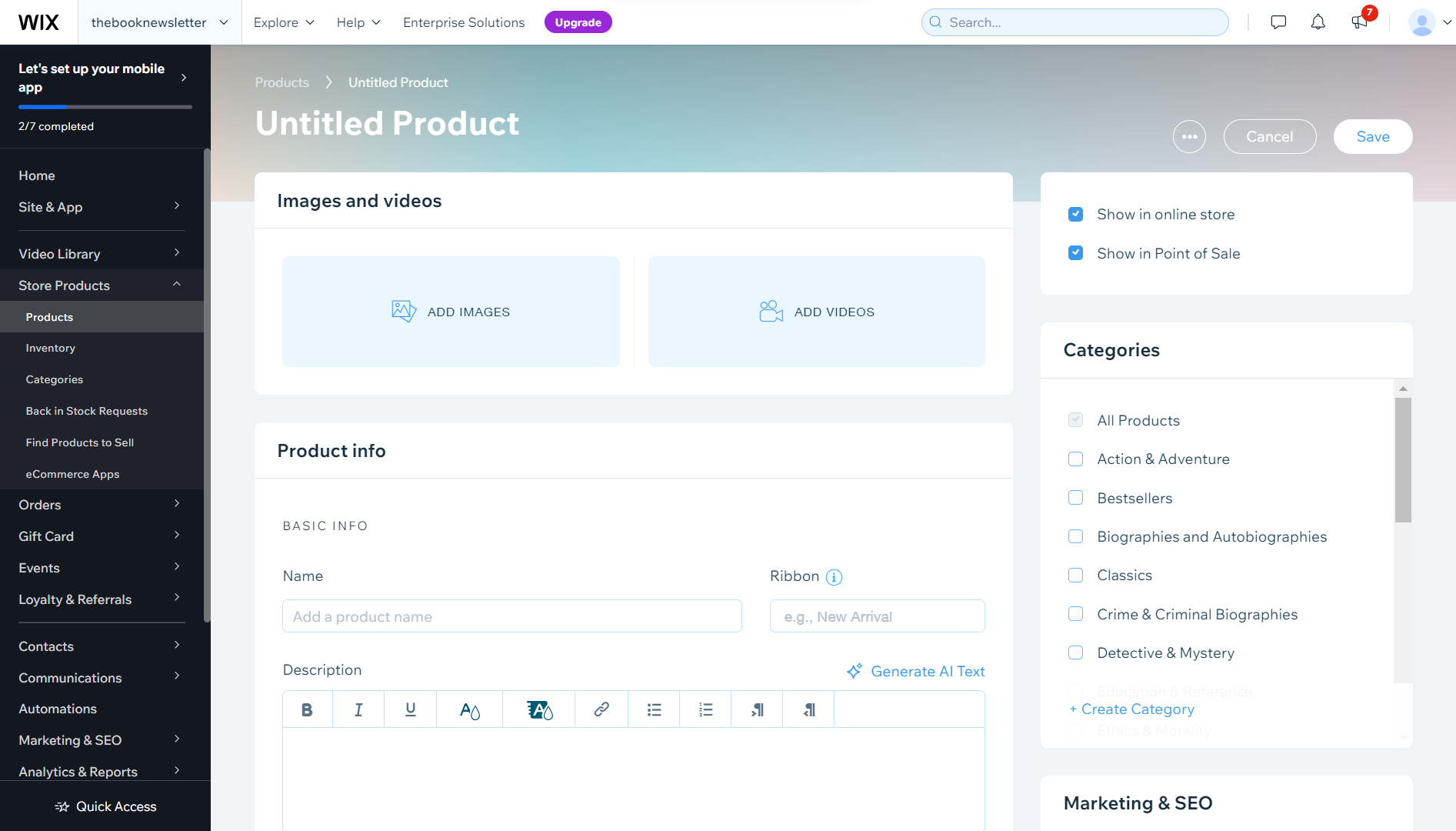
WordPress ecommerce features:
- WooCommerce Integration
- Multiple Payment Gateway Support
- Abandoned Cart Recovery
- Ecommerce Analytics
- SEO Optimization Tools
- Extensive Plugin Ecosystem
Ecommerce themes & templates
Wix provides around 120 free templates for ecommerce. However, these templates are not fully responsive and may need manual adjustments for mobile. Wix allows for flexible website design but has limited options for in-depth customization using HTML or CSS. For advanced users, Wix Velo offers more detailed customization possibilities. In contrast, WordPress offers hundreds to potentially thousands of ecommerce and WooCommerce specific themes and templates, both free and premium.
Product page customization
Wix allows you to offer up to six options per product with a total of 1,000 unique variations. However, managing so many choices can be confusing for customers, so it’s often better to split complex products into separate listings. Wix makes it easy to customize your store by adding features like ribbons, size charts, and wishlists. While it supports product videos, adding 3D models requires some coding skills. This balance of simplicity and customization makes Wix a solid option for building an online store.
On the other hand, WooCommerce on WordPress offers extensive customization for ecommerce product pages, balancing plugins, page builders, and custom coding. Important elements include product images, detailed descriptions, and add-to-cart buttons. Advanced features like product tabs, upsells, and related products are customizable. Tools like Elementor and the Ultimate Product Catalog plugin enhance functionality, but heavy plugin use may affect site performance.
Payment processing
Wix provides versatile payment options, generally around 2.9% + 30¢ per transaction, without additional commission fees. This makes Wix an attractive option for businesses using diverse payment processors. Wix Payments allows Wix users to manage transactions directly on their site, also supporting various payment methods and currencies.
WordPress doesn’t process payments directly but uses plugins like PayPal, Stripe, and Square to handle transactions. When choosing a payment gateway, consider factors like fees, security, and the type of payments you need, such as recurring or offline. These plugins integrate easily with WooCommerce for a smooth setup. It’s important to research your options, read reviews, and start with a simple setup, expanding as your business grows.
Website Editors
Website EditorsEvaluates the platforms’ website building and editing capabilities.Score Components:
- Customization tools (40%): Range and power of editing features.
- Editor usability (30%): User experience within the editor.
- Design flexibility (20%): Freedom in layout and design changes.
- Update and maintenance ease (10%): Simplicity of updating and maintaining the site.
 8.5
8.5
 8.5
8.5
Winner: Tie
. Both Wix and WordPress scored 8.5 for their website editors, offering a variety of features and customization options.
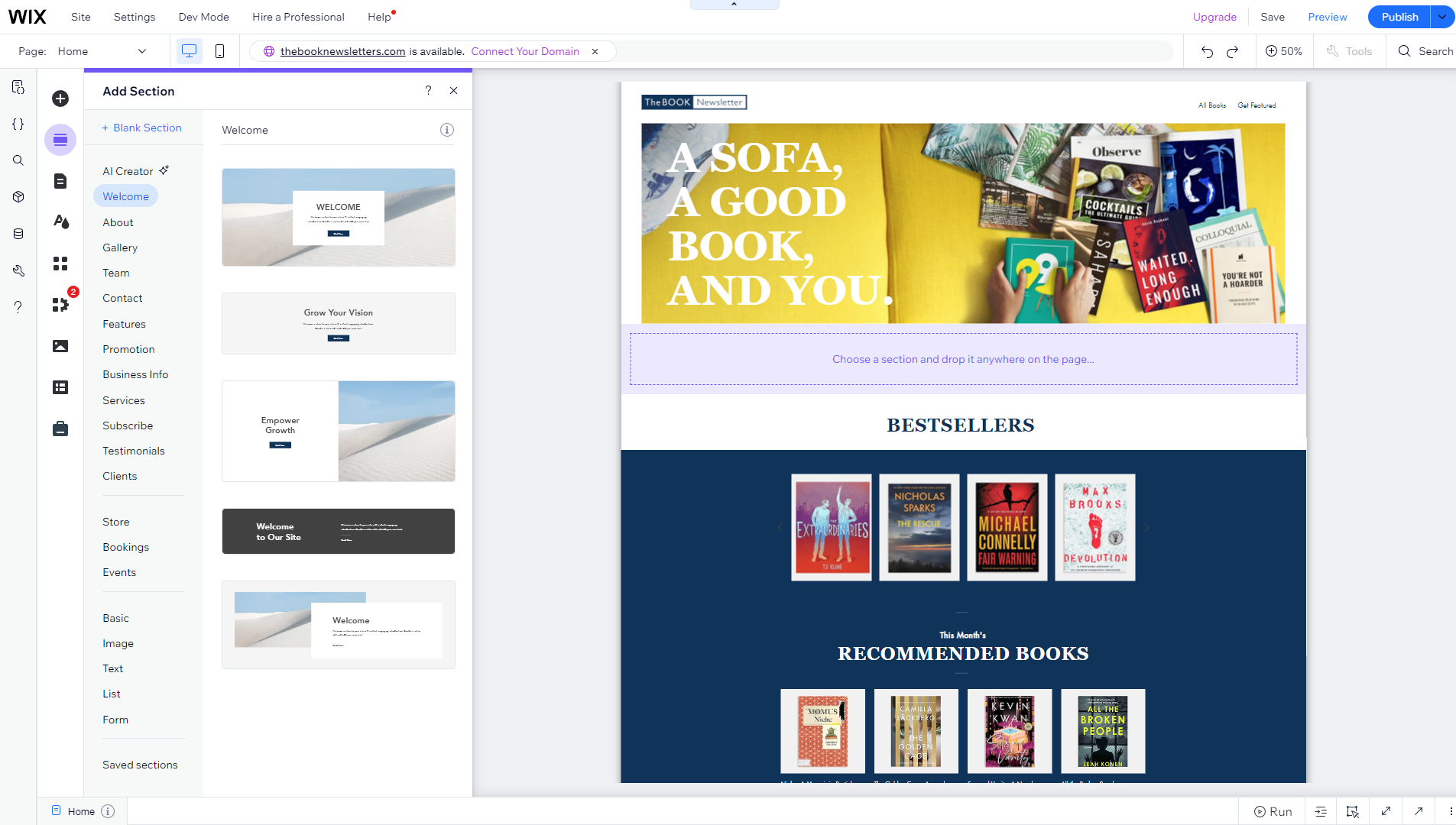
Wix offers multiple editors catering to different user needs. Its standard editor is known for its drag-and-drop simplicity, allowing for detailed customization without needing to code. Additionally, Wix provides the ADI (Artificial Design Intelligence) editor, which creates a personalized website based on user responses to a few questions, and the Corvid by Wix editor, which allows for advanced web development with JavaScript and Wix APIs.
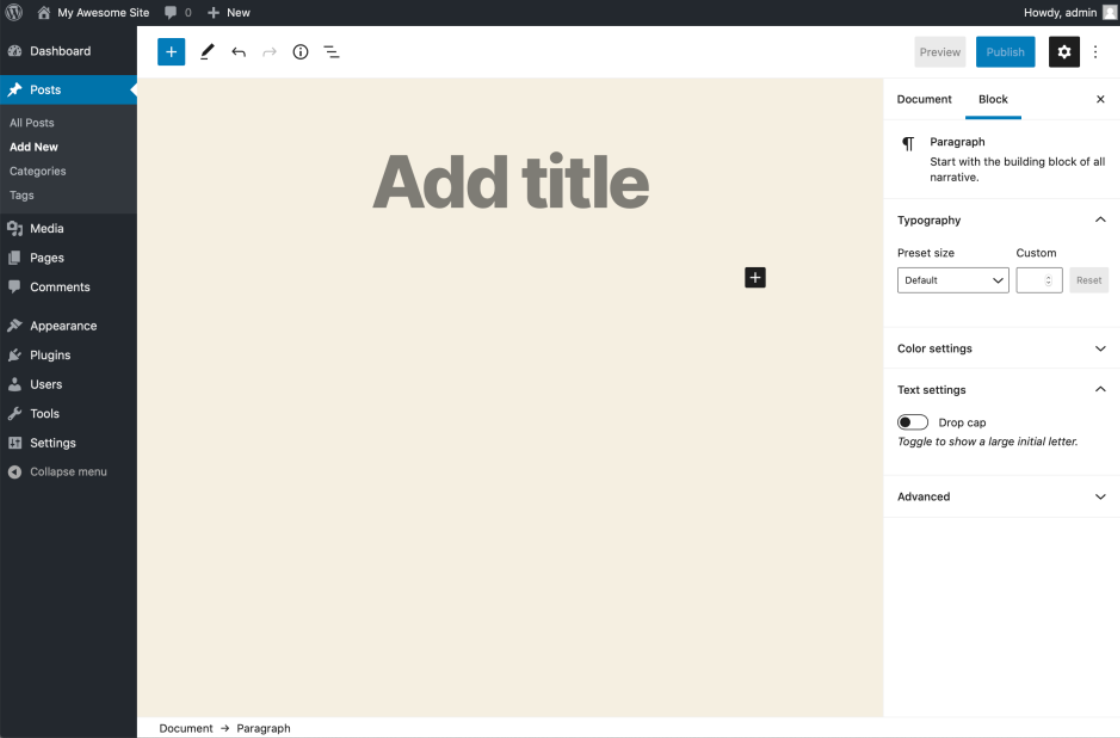
On the other hand, WordPress Site Editor offers a user-friendly interface with block-based editing, a wide range of extensive style customization, template management, page editing/creation, distraction-free modes, versatile saving options, and accessibility for users of varying skill levels. It also offers more custom code possibilities compared to Wix.
Mobile editor/app
 9.2
9.2
 8.1
8.1
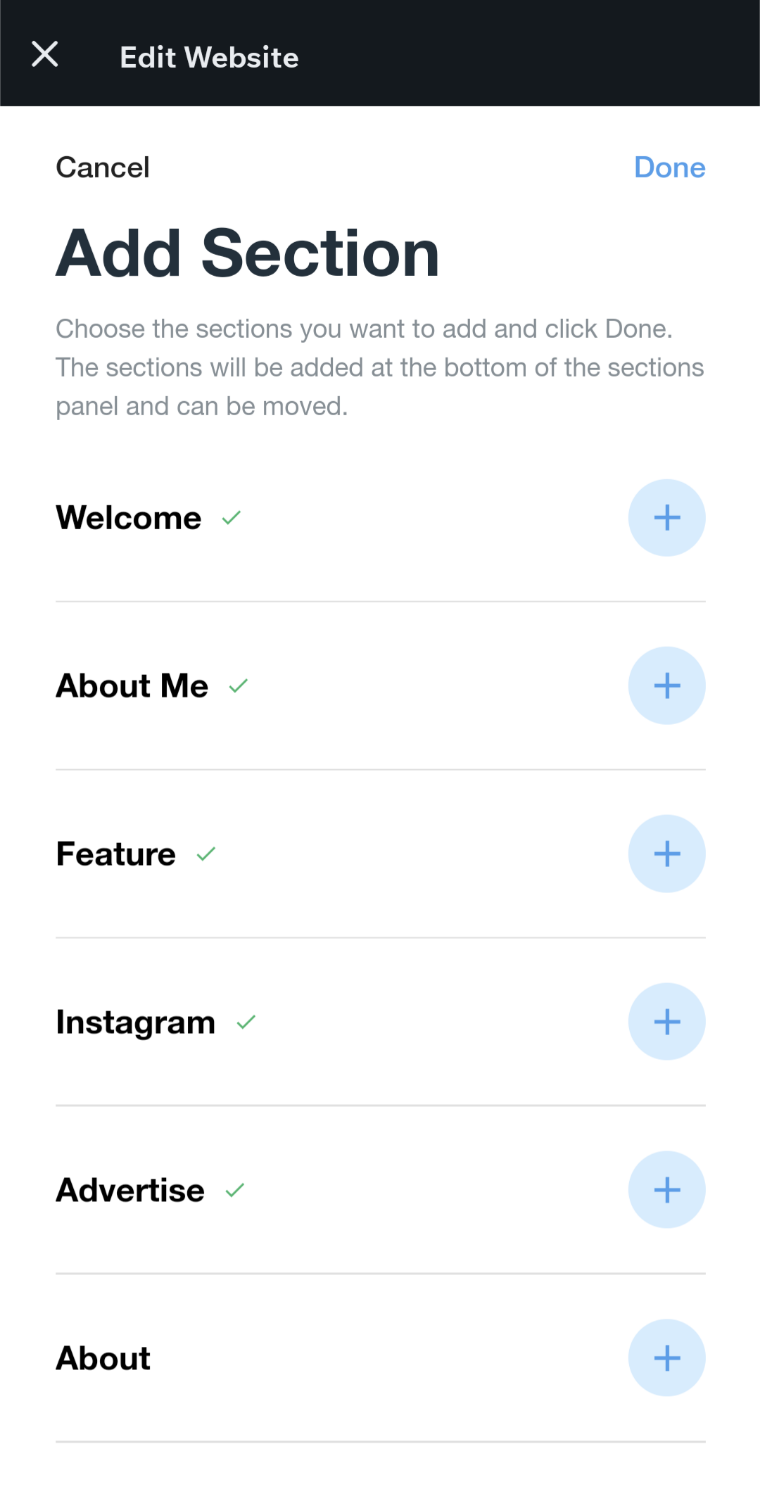
🏆
Winner: Wix
. Both Wix and WordPress offer mobile apps for managing your website, but they serve to different needs and skill levels. Wix’s mobile app stands out with its user-friendly, drag-and-drop interface, making it specially beginner-friendly. It excels in general website editing, allowing users to control nearly every aspect of their website’s design with ease.
On the other hand, WordPress’s mobile app allows you to manage your website on the go, including creating and editing posts, managing comments, scheduling content, and analyzing website traffic. However, it has some limitations compared to the web-based editor, including fewer advanced options, restricted code access, and limited design customization.
In summary, Wix receives a higher rating due to its versatility in general website editing and a more beginner-friendly interface, while WordPress offers convenience and basic functionality but is more limited in terms of advanced options and design customization.
Product testing options
Product Testing OptionsAssesses the options for trying out platform features before commitment.Score Components:
- Trial quality (40%): Extent and usefulness of the trial or free version.
- Feature accessibility (30%): How many features are available to test.
- Trial duration (20%): Length of the trial period.
- Ease of transition (10%): Smoothness of moving from trial to paid plans.
 8.1
8.1
 8.1
8.1
Overall Result
:
Tie
. Both Wix and WordPress score 8.1, each with their unique advantages in product testing. Wix offers a free plan with basic features for an unlimited duration and occasionally offers opportunities to test premium features through promotions or limited-time trials. WordPress, being an open-source CMS, offers a free version but does not provide a trial version or the possibility to test premium features. There is also no money-back guarantee as there are no payments required for WordPress.
 |
 |
|
|---|---|---|
Free Plan |
Yes (Basic features, indefinitely) |
Yes (open source software) |
Trial Duration |
Unlimited (Free plan) |
No |
Testing Premium Features |
Limited, occasionally through promotions | No |
Price
PriceLooks at the cost-effectiveness and value for money of each platform.Score Components:
- Plan value (40%): What each pricing tier offers.
- Transparency and clarity (30%): Clearness of pricing structures.
- Flexibility of plans (20%): Range of options to suit different budgets.
- Hidden costs (10%): Additional expenses not included in the plan.
 8.7
8.7
 5.9
5.9
Wix offers a range of pricing plans with various features, while WordPress is an open-source platform that is free, but requires separate purchases for domain, hosting, and website builder subscriptions.

|

|
|
|---|---|---|
Free |
No offering at this amount. |
Free Plan ($0/month): WordPress is open source software that is free. WordPress does not provide hosting services; so, it is necessary to purchase a domain, web hosting, and website builder subscriptions separately. While WordPress doesn’t have built-in ecommerce, plugins like WooCommerce offer a solution. WordPress offers a wide variety of templates and designs. WordPress doesn’t have a built-in AI-assisted builder, but its open-source nature allows for an ecosystem of plugins and themes incorporating AI for website building. |
$20-$30 |
Core Plan ($27/month): Unlimited physical products, ~2.9% + 30¢ per transaction, Digital products, Free custom domain for a year, Abandoned cart recovery, Gift cards (via app), Recurring payments, No staff account limit. Value for Price: 8.5 |
No offering at this amount. |
$30-$40 |
Business ($32/month): Advanced ecommerce features, Same transaction fees, Free domain for a year, Subscription payments, Automated international sales tax, Label printing, Dropshipping, Product reviews, No staff account limit. Value for Price: 8.7 |
No offering at this amount. |
$100+ |
Business Elite ($159/month): All ecommerce features, Automated sales tax for up to 500 transactions/month, Custom reports, Loyalty program, Priority support, No staff account limit. Value for Price: 9.0 |
No offering at this amount. |
location. As a result in rare cases the prices displayed here can differ from the ones you see on their
websites.
Hosting quality
Hosting
qualityExamines the reliability and performance of the hosting solutions.Score Components:
- Uptime (40%): Consistency and reliability of website availability.
- Speed (30%): Loading times and performance.
- Bandwidth and storage (20%): Sufficiency of resources provided.
- Data centers (10%): Quality and distribution of hosting infrastructure.
 8.5
8.5
 0
0
Winner: Wix
. Wix offers a variety of hosting plans for different needs, including a free plan with limited storage and bandwidth, and premium plans with up to 50GB of storage and unlimited bandwidth. It uses a multi-cloud infrastructure and has an uptime of 99.95%. On the other hand, WordPress does not directly provide hosting services, and the type of hosting, uptime, and data centers depend on the hosting provider users choose.
 |
 |
|
|---|---|---|
Do they offer hosting? |
Yes, included in all paid plans |
No, WordPress itself does not directly provide hosting services. |
Data Centers: |
10 globally: USA (Ashburn, Virginia; Los Angeles, California; Miami, Florida), Germany (Frankfurt), Israel (Tel Aviv), India (Mumbai), Brazil (São Paulo), Singapore, South Korea (Seoul), and Taiwan (Taipei) |
Data centers depend on hosting providers |
Type of hosting: |
Multi-Cloud Infrastructure (AWS, GCP, own data centers) |
WordPress itself isn’t a hosting platform, there are various options when choosing the type of hosting for websites built with WordPress, such as: Shared Hosting, VPS Hosting, Dedicated Server Hosting, Managed WordPress Hosting, Cloud Hosting |
Uptime: |
99.95% |
Uptime & uptime guarantee depends on hosting provider. |
Uptime Guarantee: |
No |
Depends on hosting provider |
Website Speed Optimization
Website Speed OptimizationEvaluates optimization of website loading timesScore Components:
- PageSpeed Score (30%): Google’s score indicates performance optimization.
- Loading Time (30%): The average time until a website is fully interactive.
- Mobile Optimization (15%): Optimization effectiveness for mobile devices.
- Resource Optimization (15%): Optimizing images, scripts, and other heavy resources.
- CDN Usage (10%): Use of CDN to enhance speed across geolocations.
 8.3
8.3
 6.5
6.5
🏆 Winner: Wix
Both Wix and WordPress prioritize website performance and page speed, but Wix has a more structured approach to speed optimization and better average load times and PageSpeed scores.
 |
 |
|
|---|---|---|
Focus |
Media optimization, CDN, Mobile-first |
Depends on the user’s optimization efforts |
Performance Tools |
Google PageSpeed Insights Integration |
Core Web Vitals, WP Rocket, Hummingbird |
Key Strategies |
Media optimization, CDN, Mobile-first |
User-dependent, numerous learning resources |
Load Times |
0.8s to 3.5s (Average: 1.6s) |
Varies widely, dependent on optimization |
Page Speed Scores Range |
34/100 to 98/100 (Average: 81.9/100) |
Scores vary; influenced by apps, images |
Core Web Vitals Improvement |
25% increase in good CWV scores over a year |
User-dependent, numerous learning resources |
Wix focuses on enhancing website performance and page speed, integrating tools like the Site Speed dashboard with Google PageSpeed Insights to provide a complete view of website performance metrics. They emphasize media optimization, code simplification, content distribution networks (CDNs), lazy loading, and mobile-first designs. Wix’s global CDNs enhance content delivery, leading to a 25% boost in sites with good Core Web Vitals (CWV) scores. Real-world performance analysis of 909 Wix websites shows page speed scores ranging from 34/100 to 98/100, averaging 81.9/100, with the Largest Contentful Paint, an important metric for website loading, ranging from 0.8 seconds to 3.5 seconds, with an average of 1.6 seconds.
WordPress, as an open-source CMS, doesn’t have a built-in method for website speed optimization, but it offers plenty of resources to help users optimize their sites. The speed of a WordPress site depends on factors like the hosting provider, image optimization, plugin management, lazy loading, and using a CDN. WordPress recommends tools like Core Web Vitals, WP Rocket, Hummingbird, and considering AMP for mobile speed. Load times and PageSpeed scores can vary widely based on the user’s optimization efforts and the specific elements used on the site.
Get a head start on website creation with AI
Create a custom website tailored to your business needs 10X faster with 10Web AI Website Builder!
Plugins and integrations
Plugins and integrationsMeasures the range and effectiveness of additional plugins and integrations.Score Components:
- Variety of options (40%): Range of available add-ons.
- Integration smoothness (30%): Ease of integrating plugins into the site.
- Quality of plugins (20%): Functionality and reliability of the options.
- Custom integration capabilities (10%): Support for custom or third-party integrations.
 8.2
8.2
 8.8
8.8
🏆 Winner: WordPress.
WordPress, with a score of 8.8, outperforms Wix, with a score of 8.2. WordPress offers over 60,000 free plugins, significantly more than Wix’s 500 apps. This large collection of plugins allows WordPress users to extend their website’s functionality across various domains, including advanced ecommerce tools, SEO optimization, social media integration, email marketing, website analytics, appointment scheduling, customer support, enhanced media galleries, blogging features, custom forms and surveys, diverse payment processing options, website localization, improved security measures, and the addition of custom widgets. Some of the top WordPress plugins include RankMath for SEO, WP Rocket for caching, WPForms for form creation, UpdraftPlus for backups, EWWW Image Optimizer for image optimization, and WooCommerce for ecommerce integration.
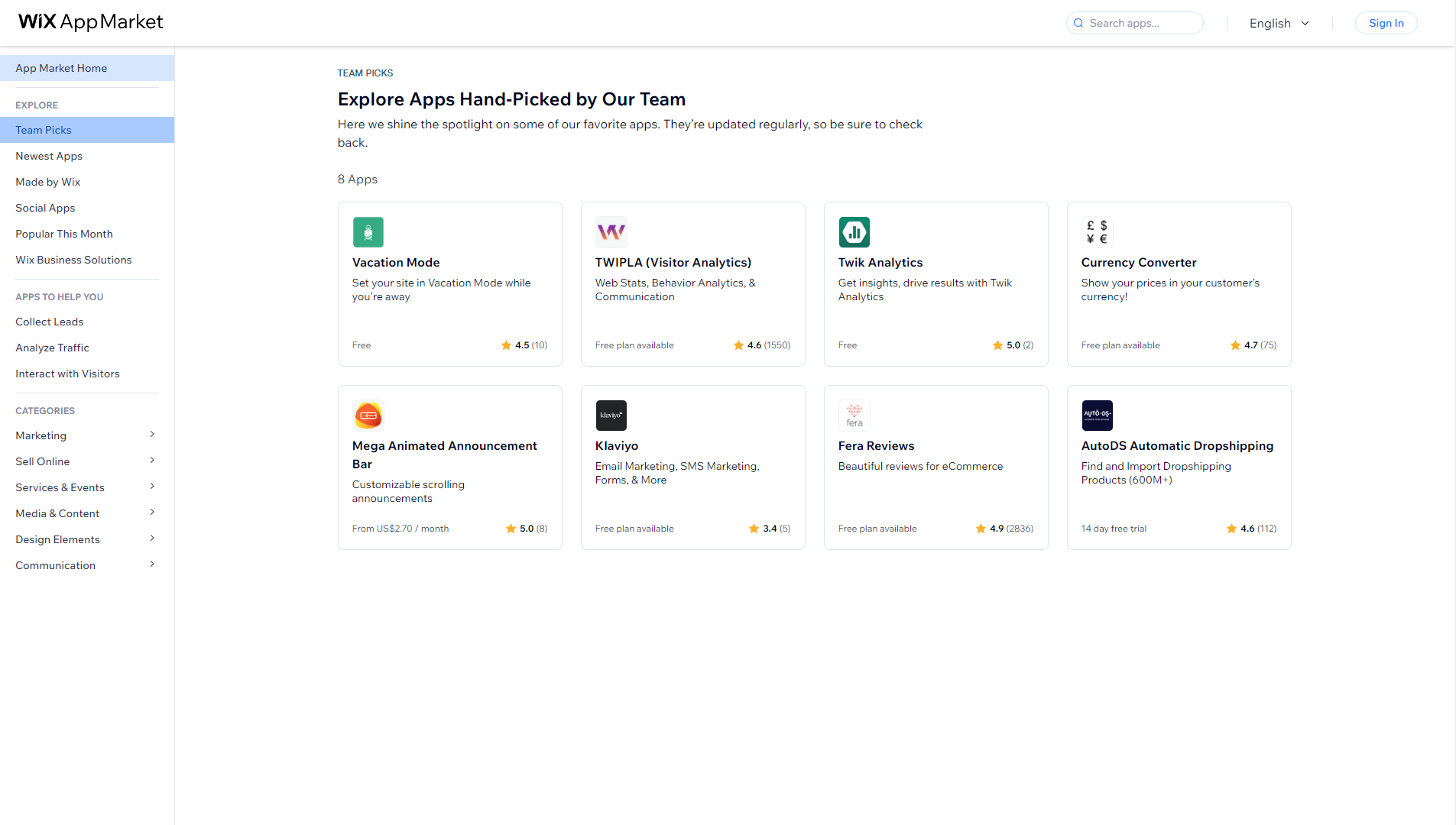
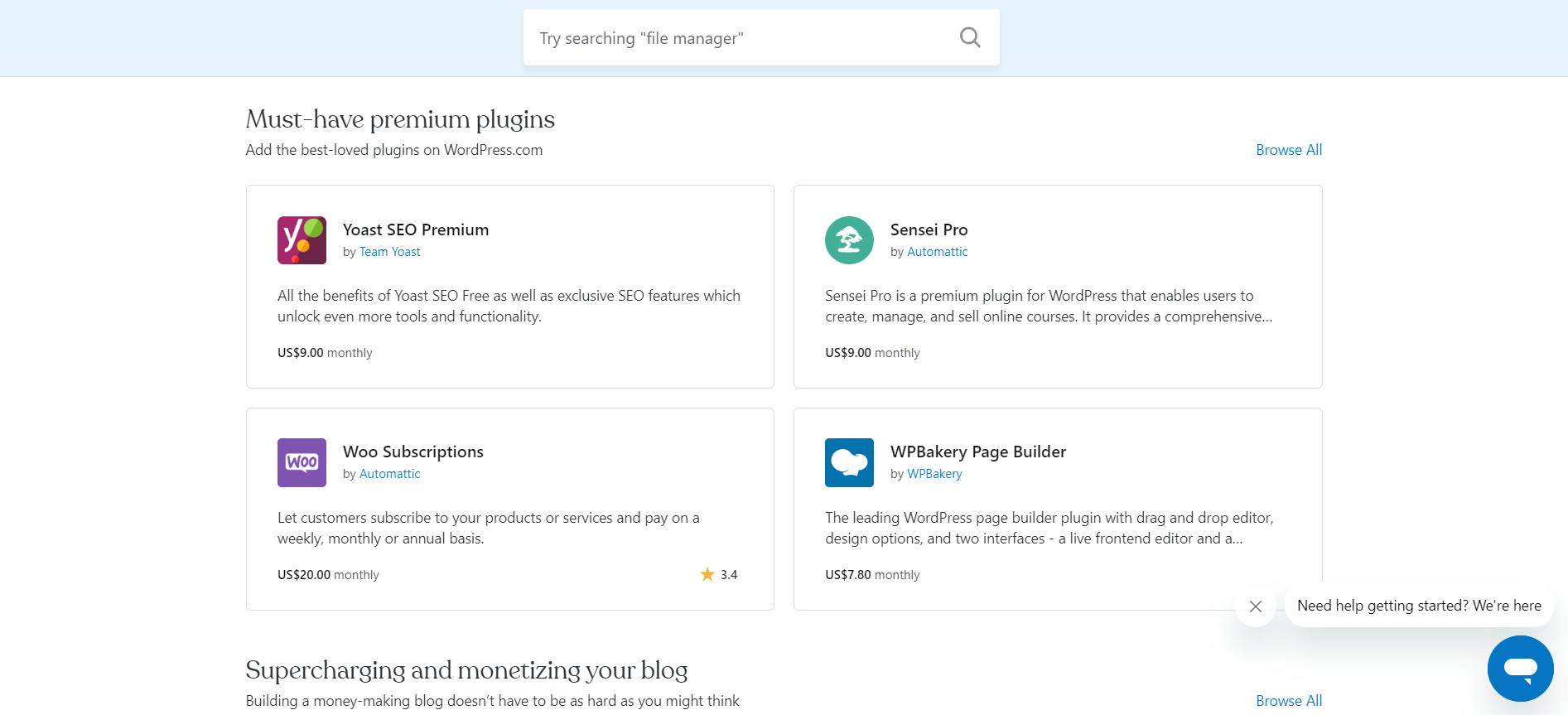
Marketing Features
Design FunctionalitiesRepresents how well each platform allows for creative design and customization of websites.Score Components:
- Template Variety (30%): Range and quality of design templates.
- Customization (30%): Flexibility and options for design alterations.
- User Interface (20%): Ease and intuitiveness of the design process.
- Responsiveness (10%): Adaptability to different devices and screen sizes.
- Innovation (10%): Unique design features and tools.
 8.4
8.4
 8.0
8.0
🏆
Overall Winner: Wix
. Wix gets attention for its integrated marketing tools, especially in email marketing, social media integration, and ad campaign management. WordPress, while strong in blogging and SEO, relies heavily on plugins for most of its marketing features.
| Marketing Features |
 |
 |
|---|---|---|
SEO Tools |
||
Email Marketing |
Requires plugins | |
Blogging |
||
Social Media Integration |
Advanced integration for selling directly on social platforms |
Requires plugins |
Analytics and Reporting |
Detailed analytics for in-depth insights |
Requires plugins |
Ads and Promotions |
Google Ads integration; sophisticated ad campaign management |
Requires plugins |
Customer Support
Customer supportEvaluates the quality and availability of support options.Score Components:
- Response time (40%): Speed of support responses.
- Support quality (30%): Effectiveness and helpfulness of the support.
- Availability (20%): Range of support channels (phone, chat, email).
- Resource richness (10%): Quality of self-help and educational materials.
 8.2
8.2
 5.0
5.0
🏆 Winner: Wix
. When comparing Wix vs WordPress, Wix succeeds with its structured and accessible customer support. Wix offers phone support (callback service during business hours), 24/7 live chat in multiple languages, and extensive forums. This ensures that users have multiple avenues to seek help and resolve issues efficiently.
WordPress, on the other hand, does not offer direct customer support because of its open-source nature. Users must rely on community forums, the WordPress codex, and support from hosting providers or plugin and theme developers. While this decentralized support can be effective, it often requires more effort from users to find solutions, making Wix the more user-friendly option for customer support.
Security
SecurityLooks at the platforms’ security measures and data protection.Score Components:
- Data protection (40%): Safeguards for user and customer data.
- SSL and encryption (30%): Implementation of secure connections.
- Compliance (20%): Adherence to industry security standards.
- Regular updates (10%): Frequency of security updates and patches.
 8.5
8.5
 6.7
6.7
🏆
Winner: Wix
. Wix offers a complete security package that includes secure servers, encryption, compliance with privacy regulations, strict access controls, regular security audits, and two-factor authentication. Wix also communicates transparently through clear privacy policies, practices data minimization, and allows user control over their data.
WordPress, being an open-source platform, relies heavily on the hosting provider and the use of plugins for security. While it does offer numerous functionalities and resources to enhance website security, such as site backups, monitoring, malware scanning, user activity tracking, permission control, and spam protection tools, the security is not as integrated and straightforward as Wix’s. Therefore, Wix is the clear winner in this category.
AI Capabilities
AI capabilitiesMeasures the effectiveness of AI-driven features and tools.Score Components:
- Automation efficiency (40%): Impact of AI on streamlining processes.
- Personalization (30%): AI-driven customization for users or customers.
- AI-Assisted design (20%): Role of AI in website design and functionality.
- Data analysis (10%): Use of AI in interpreting user data and analytics.
 8.7
8.7
 6.1
6.1
 |
 |
|
|---|---|---|
Personalized Design |
Wix ADI offers tailored design suggestions based on user inputs |
WordPress lacks a built-in AI builder, but offers AI plugins like AI Site Builder and Zita |
SEO Optimization |
AI-guided SEO advice for optimal content placement and structure |
WordPress lacks built-in AI eCommerce features, but offers AI plugins like Rank Math and Yoast SEO |
Customer Behavior Analysis |
Advanced analytics to understand customer preferences |
|
Sales Predictions |
AI-powered sales forecasting tools |
|
Inventory Management |
AI tools to assist in efficient inventory handling |
|
Content Generation |
AI assistance in creating and optimizing site content |
WordPress does not have a built-in AI-assisted builder, but offers AI plugins like AI Engine and GetGenie |
🏆 Winner: Wix
. Wix’s AI capabilities, especially its Artificial Design Intelligence (ADI) system, are designed to be both innovative and user-friendly. The ADI is great at providing personalized website design suggestions, optimizing content, and simplifying the site setup process. Additionally, Wix’s AI offers helpful SEO recommendations and layout adjustments based on how users interact with the site, making it a powerful tool for creating and maintaining an effective online presence.
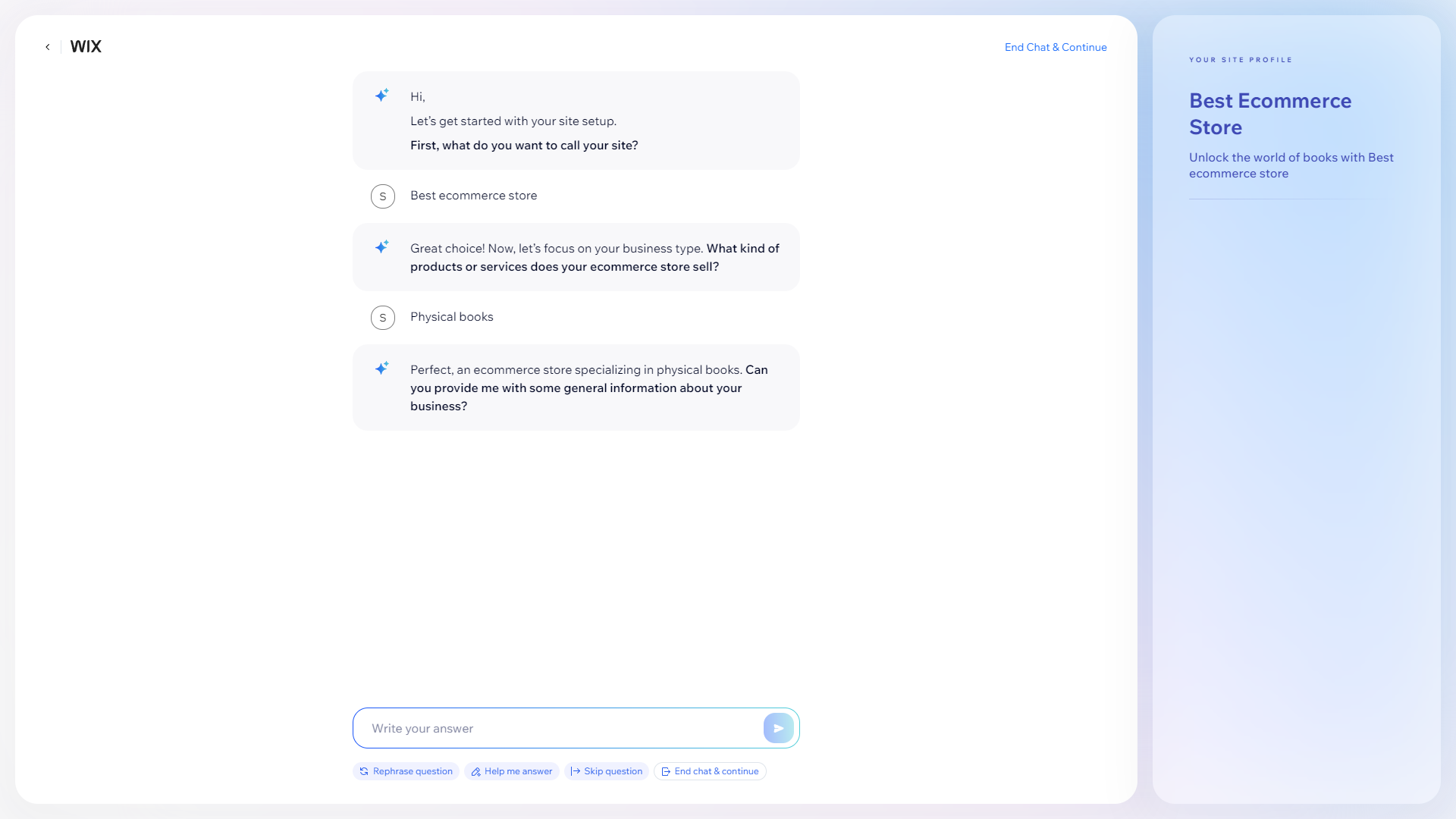
WordPress, with a score of 6.1, does not have a built-in AI builder and AI Ecommerce features; However, WordPress, being open-source, allows for a large ecosystem of AI plugins that can enhance website building, Ecommerce, content generation, and other features. This flexibility lets users choose from a wide range of AI tools to customize and improve their websites according to their specific needs. While WordPress’s AI capabilities are powerful, they are more plugin-dependent compared to Wix’s built-in AI.
User Management
User ManagementAssesses the platforms’ capabilities in managing user roles, permissions, and accessibility.Score Components:
- Role Customization (40%): Flexibility in creating and defining user roles and
permissions. - Ease of Management (30%): User interface and tools for managing users.
- Access Control (20%): Effectiveness of access control measures for different user
levels. - Scalability (10%): Ability to manage a growing number of users efficiently.
 8.2
8.2
 8.8
8.8
🏆 Winner: WordPress
. Both Wix and WordPress offer different approaches to user management and collaborative editing.
- Wix allows an unlimited number of editors, no matter which plan you’re on. However, if you have 50+ editors, it’s important to be cautious as it could cause potential backend performance issues.
- The editing access for a WordPress.org website depends on user roles and additional controls. User roles, ranging from Super Admin to Subscriber, dictate the level of permissions, while plugins and controls such as role management plugins and revision control offer further customization for specific editing rights and collaboration.
Wix User Roles and Access Levels:
| Role | Description | Access Highlights |
|---|---|---|
| Site Owner | Full control over website | Manage pages, menus, forms, SEO, settings. Create and manage editor and contributor accounts. |
| Editor | Full editing access to website content | Add/edit pages, modify text and images, adjust design elements, create forms. Cannot manage site settings or user accounts. |
| Contributor | Limited access to specific pages/sections | Edit assigned pages and sections only. No access to other site areas. |
| Member | Access to specific features | Login access to forums, private pages, or other restricted areas. Limited interaction with overall site management. |
WordPress User Roles and Access Levels:
| Role | Description | Access Highlights |
|---|---|---|
| Super Admin | Manages the entire network in WordPress Multisite. | Network admin, manage sites, users, plugins, themes. |
| Administrator | Full access within a single site. | Manage plugins, themes, users, all posts/pages. |
| Editor | Manages and publishes content, including others’ posts. | Edit/publish all posts, manage comments, categories. |
| Author | Publishes and manages their own posts. | Write, edit, publish own posts, upload files. |
| Contributor | Writes and edits their own posts but cannot publish. | Write, edit own posts (no file uploads or publishing). |
Additional Features
 |
 |
|
|---|---|---|
SSL Certificate |
||
Custom Domain |
||
Free Custom Domain Included |
||
International Domains |
||
Mobile Responsive |
||
Page Speed |
||
Website Builder Mobile App |
||
Convert a Website To An App |
||
Website Analytics |
||
Multilingual Sites |
||
Multiple Users |
Wix vs WordPress: User Feedback
Wix caters to a diverse set of website requirements beyond just ecommerce. This inclusive strategy attracts a broad user audience but might not align as closely with individuals prioritizing advanced ecommerce features. Its user-friendly interface and range of templates make it a popular choice for those looking to build and manage an online presence without coding.
WordPress receives praise for its user-friendliness, cost-effectiveness, extensive themes and plugins, customization options, and supportive community. However, users mention technical challenges, security concerns, a learning curve, and a lack of direct support. Overall, it remains a widely used and versatile platform, especially beneficial for startups and small businesses.
The making of this blog
We followed a clear, step-by-step process to write and research this article.
Wix vs WordPress: FAQ
Which platform is better for beginners, Wix or WordPress?
Can I use both Wix and WordPress for ecommerce?
How do Wix and WordPress differ in terms of customization and design flexibility?
What are the major differences in pricing between Wix and WordPress?
Which platform offers better support, Wix or WordPress?









